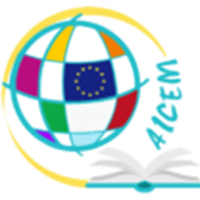AICEM - Associazione Internazionale per la Cooperazione e l'Educazione nel Mondo
| Name | AICEM - Associazione Internazionale per la Cooperazione e l'Educazione nel Mondo |
|---|---|
| Logo | 
|
| Country | Italy |
| City | Rome |
| Address | Via Carlo Poma, 2 00195 - Roma |
| Coordinates | 41.913972996322, 12.462081517024 |
| Foundation year | 2009 |
| info@aicem.it | |
| Website | https://aicem.it/ |
AICEM (International Association for Cooperation and Education in the World) is a nonprofit organization established and run by young volunteers with the goal of empowering the voice and skills of young people through the dissemination of values and principles based on Human Rights, active since 2009.
The intent of the association is to work extensively so that the change is effective and reaches deep within the social fabric, and the local realities of our volunteers and the contexts that need and require AICEM's support.
AICEM believes believe that "education" is the "key" word and common thread of all projects: that is why the main target of our activities are young and very young.Through the implementation of national and international activities, we intend to give voice and space to young people.
The work of AICEM is based on four motivational levers:
- Gratuity: Gratuity in carrying out activities and providing services to our communities as a profound awareness of the importance of each person's commitment to the development of all, without instrumentalization and with full respect for the dimension of the person.
- Need: The political need to fight to remove the causes that generate circuits of marginalization and discrimination, with special reference to minors and young people, putting the young person at the center through the search for new forms of cooperation.
- Collaboration: The need to pursue, through community action, collaboration among social classes, the disadvantaged, and all actors in civil and institutional society, including in developing countries, to achieve participatory and real social change.
- Commitment: We are guided by direct engagement in civil society to enforce respect for the human person and protect his or her rights, life and health; foster mutual understanding, friendship, cooperation and lasting peace among all peoples.
Activities
Through the implementation of national and international activities, we intend to give voice and space to young people.
Therefore, AICEM promotes change from the bottom up through the transmission of knowledge and skills, always starting from the needs, ideas and dreams of our members and volunteers and associates.
AICEM's mission is to foster/create safe spaces within which children and youth from all parts of the world can develop skills, abilities, and competencies to actively engage in their societies and implement their ideas and proposals for change to make their communities better.
AICEM supports its activities mainly through participation in public and private funding calls and more rarely through private donations, fundraising campaigns. It also recognizes the importance of communication to achieve the goals and objectives of the association and for this reason it is also committed to producing "slow" and reliable information through the newspaper of which it is publisher OpenMag to use, in a synergistic but responsible way, the new social media, knowing full well that the correct and conscious use of information and relational flows that travel on the global internet can prove to be the fundamental key to a better future.
AICEM is committed to supporting the personal, professional and emotional growth of each of its associates. To achieve this, each associate is invited to think, develop, promote and manage his or her own social project, in line with the statutory mandate with the support of the entire structure. He is likewise invited to support the projects and activities of other associates with his own knowledge and skills.
AICEM wants to realize the vision of living in a world where all children and youth have a real opportunity to express their potential and find their role within society, actively contributing to the sustainable development of their communities.